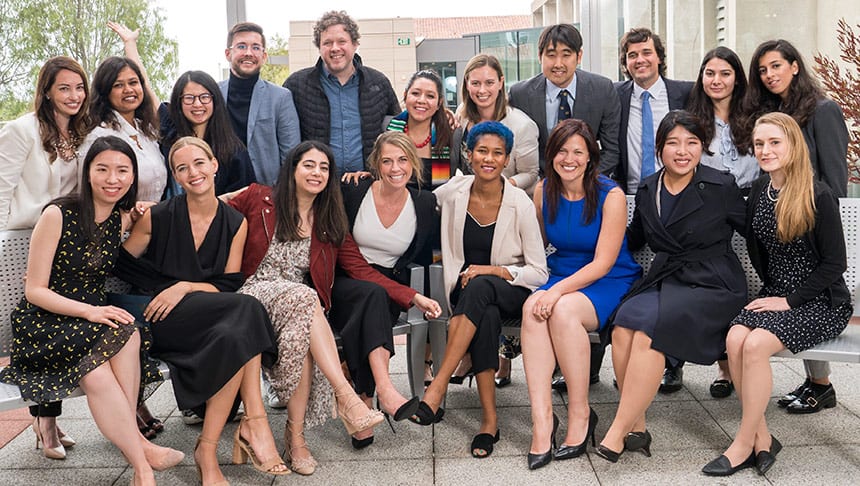
By Andrew Cohen
As the urgency of global issues from climate change to immigration escalates, so does the importance of international law. On May 9, a ceremony honored Berkeley Law graduates who earned the school’s International Law Certificate of Specialization—and emphasized growing needs in their field.
“Law is inherently global,” Dean Erwin Chemerinsky said while congratulating the 26 recipients. “International and comparative law is a core part of our curriculum, and I’m proud that Berkeley Law is one of best law schools in the world in regard to this area.”
To obtain the certificate, students must take the foundational International Law course and 13 overall units focused on international and comparative law, and complete a paper of 20 to 30 pages on a topic in the field.
Many students also capitalize on myriad opportunities for relevant experience outside the classroom. Professor Saira Mohamed, a member of the school’s robust international faculty roster, noted that most recipients were actively involved with the International Human Rights Law Clinic, which supports litigation, policy reform, and advocacy on behalf of vulnerable populations worldwide.
Students also worked with Berkeley Law’s Human Rights Center, had an overseas internship or field placement, joined the Berkeley Journal of International Law, participated in international moot court competitions, and led international-focused Student-Initiated Legal Services Projects.
“They raised important questions about the strength of historical alliances and the stability of international governance, and reminded us constantly that we live in an interdependent world,” Mohamed said.
Emceed by International Human Rights Law Clinic Co-director Roxanna Altholz ’99, the ceremony also highlighted international law’s domestic influence. Mohamed pointed out that 24 states have joined the U.S. Climate Alliance, which aligns with the 2015 UN Paris Agreement, even though the federal government announced its intent to withdraw form that accord.
Inspiring students
The ceremony’s two student speakers conveyed appreciation for the immediate chance to take on meaningful global issues at Berkeley Law.
A former paralegal, Antonia David amassed 33 credits in international law courses—20 more than the certificate requirement. She also worked on the California Law Review and Berkeley Journal of International Law, was a teaching assistant for the UN Human Rights Practice course, assisted the California Asylum Representation Clinic, and was a fellow at the Miller Institute for Global Challenges and the Law.
A memorable highlight: going to Uganda with other students as part of the Human Rights Center’s Sexual Violence Program, which aims to improve accountability for and bolster protection from sexual violence in areas affected by armed conflict and other humanitarian emergencies. They worked with Ugandan lawyers, policymakers, and law students to improve decision-making, law reform, and resource allocation.
“Our hunger to effect change is what binds us together,” David said.
Jessica Koningisor LL.M. ’19 came to law school having served as a lieutenant commander in the U.S. Navy Judge Advocate General unit at the Pentagon. An assistant to the Navy’s top military attorney, she taught more than 500 senior officers in various legal subjects at the Naval Justice School.
Active in the student organization Military and Veterans at Berkeley Law as well as in clinic, center, and student-led projects focused on global crises, Koningisor hailed the depth, acumen, and support of the school’s “incredible” international law faculty.
“Perhaps one of the most extraordinary aspects of our experience is that … so many of us have been able to jump into the trenches with the unwavering confidence of these professors,” she said.
After Mohamed touted the need for “students committed not just as lawyers familiar with the rules of international law, but who appreciate its value, urgency and necessity,” Koningisor seemed ready to answer the call.
Her time at Berkeley Law, she said, “reminded me never to become complacent about the world and how we can change it.”